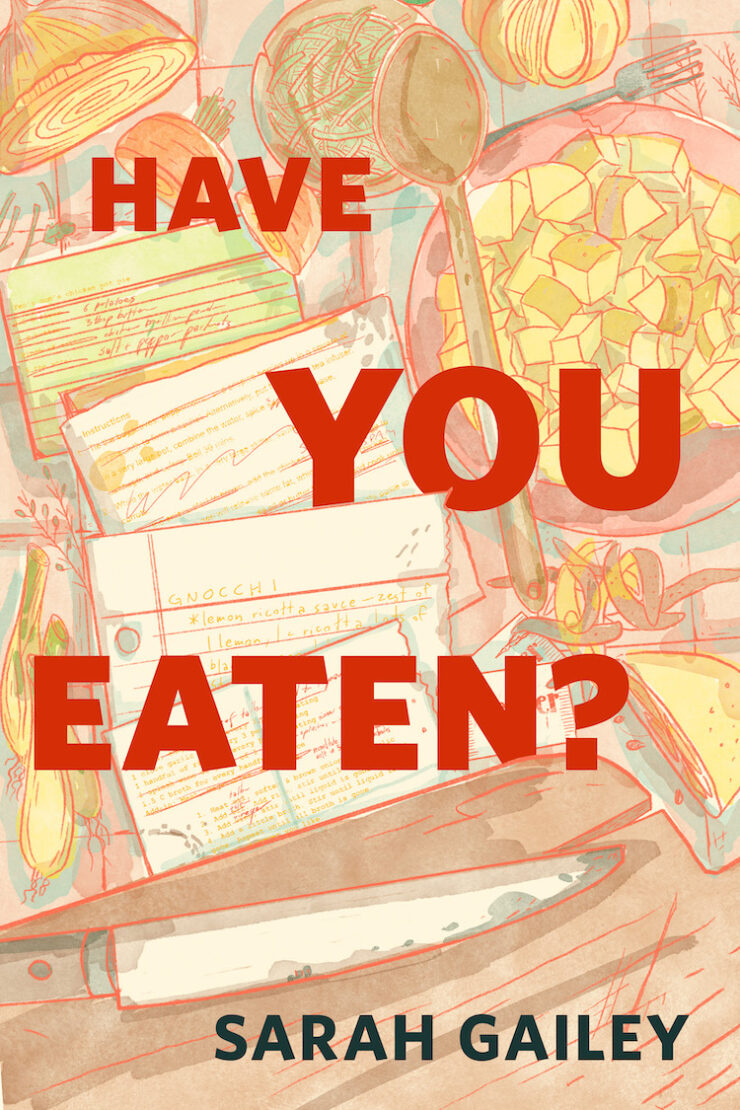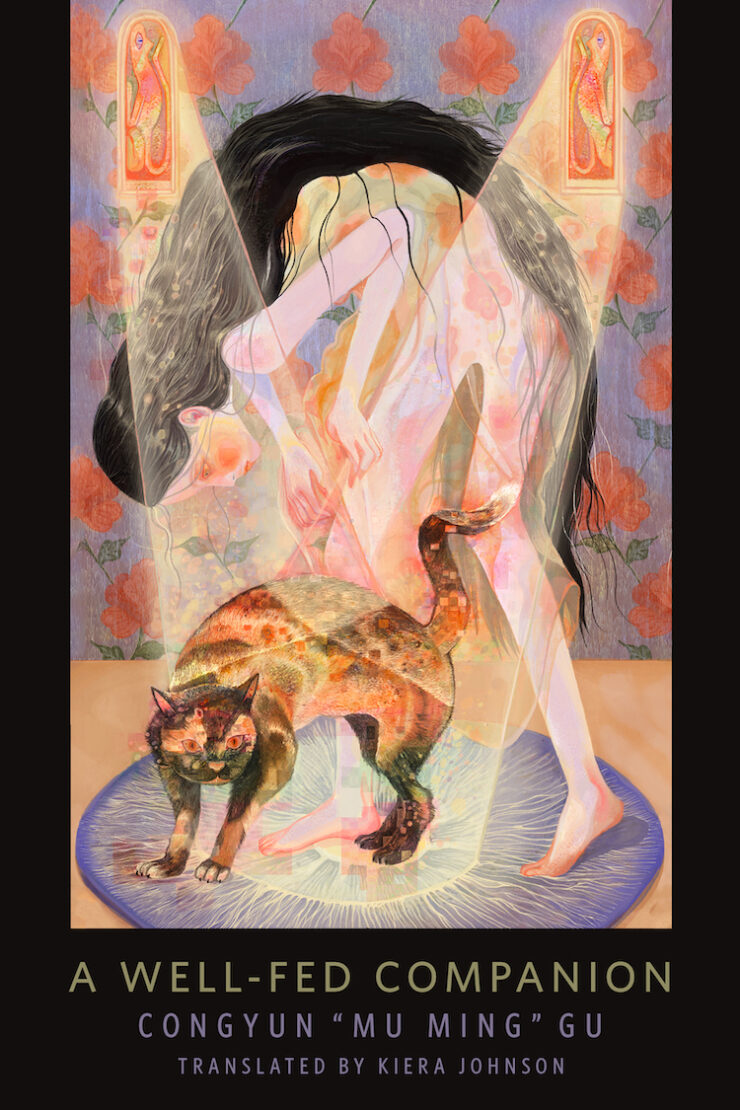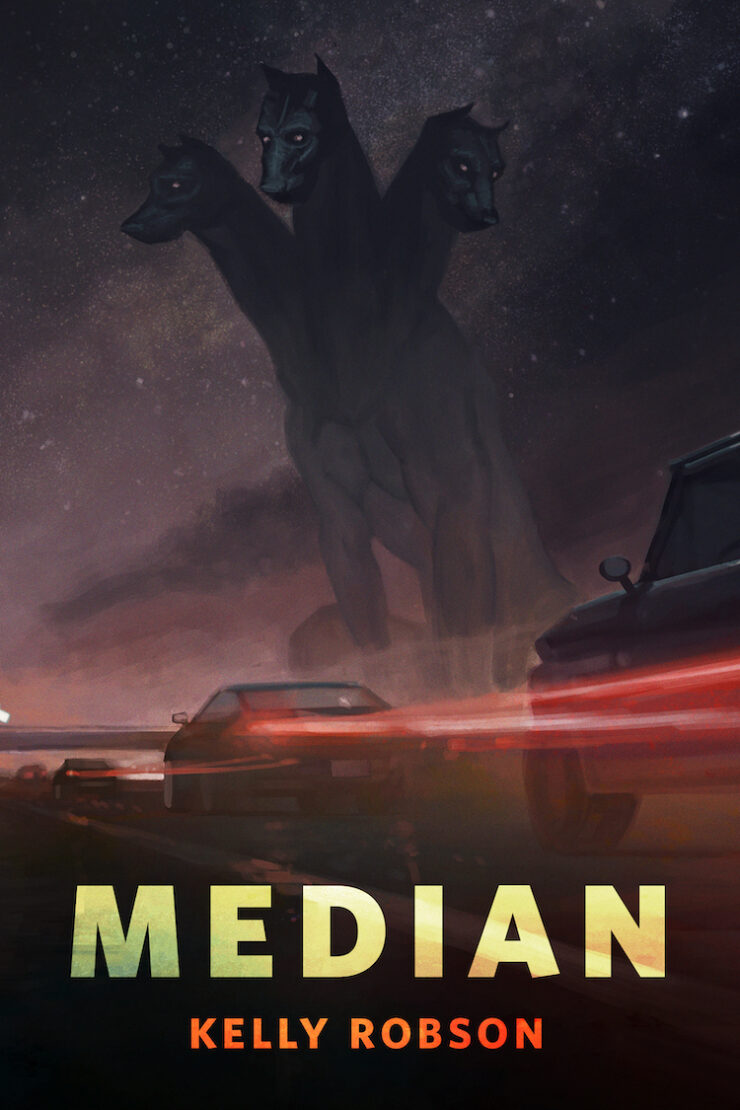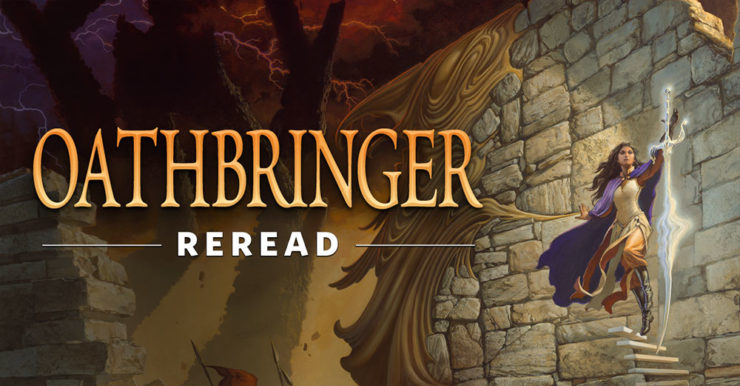Welcome back to the Oathbringer Reread, loyal Knights, Ardents, or whatever else you are! This week we’ll be covering two chapters, in which we see a bit more of Dalinar’s past (and his first meeting with Evi!) and get a little glimpse of Kaladin’s continued journey with the parshmen. Questions abound in these chapters… how crazy was young!Dalinar for walking around in a highstorm? Who sent that assassin after Gavilar? What makes an enemy, and who deserves to die in a war? And just what the heck are those spindly light-things that are walking around in the highstorms, anyway?
Reminder: we’ll potentially be discussing spoilers for the ENTIRE NOVEL in each reread. If you haven’t read ALL of Oathbringer, best to wait to join us until you’re done, but we don’t have any broader Cosmere speculation this time around, so if you haven’t read the rest of Sanderson’s books, you’re safe to read on.
Chapter Recap
WHO: Young!Dalinar; Kaladin
WHERE: Somewhere in Alethkar; both are in unspecified locations
WHEN: 1142 (31 years ago, or about 2 years after the previous flashback); 1174.1.3.4 (the day after we last saw him at the end of Chapter 17)
Chapter 19
In this flashback chapter, Dalinar is attending a feast with his brother and Sadeas. He realizes that he’s forgotten his favorite knife, and heads out into the highstorm to look for it. When he returns, everyone is horrified that he just went out for a casual stroll in the midst of such carnage. Gavilar has a discussion about the Rirans who wish to form an alliance with them in return for a set of Shardplate, then an assassin attempts to stab him. Dalinar thwarts the attempt, then agrees to marry Evi, the Riran ambassador’s sister.
Chapter 20
After that fun little flashback (which is the last fun flashback we’ll see out of Dalinar for the rest of the book), we return to Kaladin and his group of runaway Parshmen. Not much happens here, except for a deep conversation about who deserves to have a say in the slavery of the Parshmen, which we’ll get into below.
Threshold of the Storm
Titles
The Subtle Art of Diplomacy; Cords to Bind
“I wonder if men who use cords to bind are fools, since tradition, society, and momentum are going to tie us all down anyway.”
Lyn: Good old Sanderson, dropping these philosophical truth-bombs on us one after another.
Heralds
Chana & Vedel
Alice: Chapter 19 has Chanarach in all four spots: the Guard, Brave & Obedient, patron of the Dustbringers. That’s… sort of everywhere here, isn’t it? Dalinar guarding his brother, brave in warfare but obedient to Gavilar’s political need, and also rather destructive when loosed.
Chapter 20, interestingly enough, gives us Vedel: the Healer, Loving & Healing, patron of the Edgedancers; she’s apparently also a real healer, since Taln’s mutterings claimed that she would train the surgeons in preparation for a Desolation. The chapter starts with Kaladin bandaging Khen’s arm and giving instructions for wound care, but it’s all about caring for people… and figuring out how to know who to care for.
Icon
Kholinar glyph, inverted for 19, Kaladin’s spears and banner for 20.
Epigraph
None for chapter 19, 20’s is as follows:
However, with a dangerous spice, you can be warned to taste lightly. I would that your lesson may not be as painful as my own.
—From Oathbringer, preface
A: Last week we talked about spices as something you need to experience for yourself, and tied it to Shallan’s inability to truly be Veil because of never having experienced that lifestyle. This week, Kaladin is having difficulty “tasting lightly”—it’s not in his character to care superficially for people. When he becomes involved in someone’s cause, he tends to throw himself fully into it—being the best soldier in Amaram’s army, protecting his bridgemen, protecting the Kholin family, and now aiding this troop of former parshmen. And as we all know, that inability to taste lightly—or care lightly—is going to hurt later. That doesn’t mean it’s a bad thing, but it’s going to be painful. Maybe not as painful as Dalinar’s lesson, though, so there’s that.
Stories & Songs
Outside the feast hall, a storm raged like a madman who’d been locked away, impotent and ignored.
L: Interesting choice of words here, considering that later in his life Dalinar will lock away one of the Heralds who returned, thinking him a madman…
Relationships & Romances
“Excuse me, Lord Gavilar,” Toh stammered. “I… I find myself in need of refreshment.”
L: This poor guy. Dalinar must look like an absolute monster to him—and he’s got to face the fact that his sister is going to have to spend the rest of her life with him.
But that hair. It made her stand out, like a candle’s glow in a dark room.
A:Like father, like son? Because that’s almost the exact same reaction Adolin had, the first time he saw Shallan.
L: Because I was curious, I went and looked it up:
Who was that?
Gorgeous red hair. There wasn’t a single lock of black in it.
L: Guess the Kholins just have a thing for hair!
A: Apparently! But they also have a thing for different. Part of what appealed to Adolin was that Shallan was so different than the Alethi, with her red hair, her slenderness, and her fair skin.
L: And the freckles. He definitely pointed out her freckles. (Adorable.)
A: Yes, he did! Here, Dalinar notes Evi’s slenderness as well, and in both scenes the men call out the women’s figures as a contrast to the typical Alethi… statuesque build. I suppose for Dalinar, part of the appeal is that Evi doesn’t look anything like Navani, but still—both Dalinar and Adolin seem to be drawn to the way their respective brides-to-be look so different from everyone else.
L: This seems pretty true-to-life, in general. A lot of people are attracted to the exotic.
Bruised & Broken
“I know it looks deep, but it’s often better to be cut deep by a sharp knife than to be raggedly gouged by something dull.”
L: I’m going to put my pricey English BA degree to use here and posit that Sanderson’s not just talking about physical wounds. Better to be hurt swiftly and deeply than to have something drag on and on. The question is, which particular emotional wound would this be foreshadowing? Kaladin’s pain over seeing those on both sides of the conflict die? Moash’s betrayal? Something deeper that we haven’t seen yet (please god no, poor Kal’s been through enough)?
A: Tarah, maybe? Or Amaram’s betrayal and the murder of his squad? In the first case, it seems to have been fairly quick (though we’ll talk more about that when we get the story). In the second, the initial betrayal was pretty sharp, but the ongoing fact of the slavery to which Amaram sold him definitely dragged on. And on. And on.
On the other hand, the arc that Kaladin goes through when they reach Kholinar, of getting to know the Wall Guard and then the agony of watching his friends killing each other, followed by the slog through Shadesmar feeling helpless and conflicted, and repeated unable to speak the fourth Ideal… that could definitely be foreshadowed right here. Ouch.
“I hate,” Sah continued, “feeling like a child. … I hate being taught things that I should already know. Most of all, I hate needing your help. We ran. We escaped. Now what? You leap in, start telling us what to do? We’re back to following Alethi orders again.”
L: I feel so bad for these parshmen.
A: I know, right? Kaladin has so much to offer them, but it’s got to feel just horrible to have to learn it from him. I long to see some of these former slaves found by the former Listeners, assuming Thude & Co. managed to survive. (We still don’t know, do we?)
“And that’s why we should be free now? Because we’re acting like you? We deserved slavery before, when we were different?”
L: Hoo boy. There’s a lot going on in this little bit. Cultural Erasure—one culture trying to force another to conform to their ideals and norms—is a long-standing tradition in humanity. We see it in the missionaries of old Christianity, we see it in the European settlers when they discovered the Native Americans, and we see echoes of it in gentrification today. If someone is different, the first tendency historically speaking seems to be to change it to suit our own view of “normalcy.” Or, as in this case… to enslave it. To view it as lesser than. Sah’s got an excellent point that just because they’re acting like “normal” Alethi now, doesn’t mean that they were any less deserving of respect when they weren’t.
A: It’s far more complicated than that, though. On the one hand, the parshmen would never have been enslaved had not Melishi broken their Connection.
L: …who? Is this more WoB stuff that I’m not caught up on?
A: Oops. Right. Melishi was referenced in the epigraph to WoR chapter 58; he was the Bondsmith who came up with the idea that “dealt with the Voidbringers.”
L: So all of this was spelled out there, or is this a combination of epigraph and WoB type stuff?
A: It’s kind of a combination. There’s some spelled out, and some stacked together by combining epigraphs. As I understand it (and I could be wrong on this), Melishi concocted and enacted the plan to trap the Unmade that gave the parsh the ability to bond spren and take on the forms. On a bet, this ended the “false Desolation,” which happened sometime after the Oathpact was broken but before the Recreance. (Or some guess that this was actually at the same time as the Recreance.)
L: Ahhhh okay. Thanks! Now back to your regularly scheduled train of thought…
A: Well, once their Connection was broken, the parsh might have died out as a people without the humans taking care of them. That doesn’t justify ownership of once-sapient beings, necessarily, and it most certainly doesn’t justify treating them like animals as some clearly did. At the same time, since the humans broke them, it was the responsibility of the humans to care for them, and it seems only fair that they should participate in their own care by doing useful work.
It’s really a complex issue. Was Melishi wrong to end a war by imprisoning the Unmade who enabled the parsh to take on the forms? He probably saved a lot of lives by doing it—both human and parsh. Once done, would it then have been wrong to let the mind-numbed parsh wander off and die out? Was it better to take them in… and make slaves of them? There’s no easy answer. (But oh, how it hurts to know that a sapient people were reduced to bare sentience by the action of one man.)
Storms, I shouldn’t be here. I’m starting to want to defend these people! Teach them to fight. I don’t dare—the only way I can fight the Voidbringers is to pretend there’s a difference between the ones I have to protect and the ones I have to kill.”
A: Well, that there is some seriously painful foreshadowing! I’m pretty sure this will tie to Kaladin’s fourth Ideal, but in the meantime, it’s exactly why he froze in Kholinar: because there was no difference, in that moment, between the ones he had to protect and the ones he had to kill. He had to protect them all, but they were all killing each other. So he froze.
L:It’s heartbreaking. I love what Sanderson’s doing here. This isn’t clear-cut Good vs Evil like Tolkien’s orcs—the bad guys aren’t dressed all in black and laughing maniacally as they’re tying damsels to the train tracks. They’re just people, people with a legitimate grievance and reason to seek retribution for the wrongs that have been done to them. Both sides are the “good guys.”
A: That Sanderson. Again with the complex scenarios that cannot be fixed and tied up with a nice neat bow.
Squires & Sidekicks
A: I’m going to put this here, where it doesn’t entirely belong, but … sort of?
“We’ve been assessing the sister,” Ialai said, leaning in from Gavilar’s other side. “She’s a touch vapid—”
“A touch?” Navani asked.
“—but I’m reasonably sure she’s being honest.”
… “She kept trying to eat with her safehand,” Navani said, eyebrow cocked.
… “They go about half-clothed out in the far west, you know. Rirans, Iriali, the Reshi. They aren’t as inhibited as these prim Alethi women. I bet she’s quite exotic in the bedroom.…”
A: This really infuriated me. I’ve never liked Ialai (we weren’t supposed to, right?) but I’ve always loved Navani. Until this. I remind myself that they’re probably in their early twenties, and they haven’t likely traveled outside of Alethkar, but they make fun of Evi simply because she comes from a culture different than their own. Young!Navani isn’t a terribly nice person any more than Young!Dalinar, though she’s not as barbaric as he is, and she doesn’t need to change as much over the next thirty years.
L: Yeah. This has a bit of a Mean Girls vibe to it and it’s a little off-putting.
Flora & Fauna
Dalinar glanced and saw something luminous in the distance: a gargantuan figure that moved on spindly glowing legs.
A: What under the three moons is this? I’ve heard a variety of theories, but none of them really answer all the objections. If it were the larger form of a chasmfiend, wouldn’t Dalinar recognize it later? If it were a thunderclast, likewise. In fact, that’s the biggest argument against it being any of the creatures we’ve seen so far—Dalinar has seen all of them, and has never once thought that one of them was similar to that thing he saw in the storm.
The best I can say is that it’s probably in the category of things that rely on spren & Stormlight in order to function at that size.
L: A stormspren, perhaps? If there are rainspren, surely the storm itself must have one, and it would be far larger than most other spren. The Stormfather isn’t really the manifestation of the storm itself, after all—it’s more like he possesses it. Perhaps smaller storms have these as well. (Although, come to think of it… does Roshar even have smaller storms, or is it just the highstorm—and now the Everstorm—that sweeps through?)
A: Hmmm. I hadn’t thought about the possibility that it might be a spren, rather than a spren-supported critter. I’ve also assumed that it’s likely the same sort of beastie that Kaladin and Shallan saw during the highstorm in their chasm crawl, in Words of Radiance, Chapter 74:
He swore he saw an enormous figure walking up there, a glowing inhuman form, followed by another, alien and sleek. Striding the storm. Leg after leg, until the glow passed.
Is it valid to assume they’re the same kind of critter? Or are there multiple strange and usually not-seen beasts wandering around during highstorms? I’ve been checking, and as near as I can tell, every question touching the subject has gotten a RAFO. Guess we’ll have to… um… read and find out.
Places & Peoples
“Yes, sieges happen now and then, but it’s very hard to starve out a city’s soldiers while there are Soulcasters and emeralds to make food.”
L: Tactically, this is really interesting to think about! The challenges inherent in defeating an enemy who has a limitless supply of food and rain-water, thanks to the highstorms…
A: I enjoyed the brief tactical discussions in this chapter. They didn’t go into an extended strategy infodump, but I love the way these Westerners give us a chance to learn about different approaches to warfare. Like, you can’t starve them out if they have Soulcasters.
“Soulcasters. We have not these things in Rira or Iri.”
L: I wonder why not…
A: I wonder how much fabrial technology they have at all; we haven’t really been told how widespread it is. I suspect the reason Rira and Iri don’t have them might be related to the source of the supply; as far as we know, no one around now is capable of making new ones, right? So every Soulcaster fabrial in existence is from the ones that have been maintained since way back whenever-they-were-made, which seems to have been at least before the scouring of Aimia, right? Hmm. Clearly I need to go research Soulcasters again, because I can’t remember what we know about them!
L: Well, Navani and others are making fabrials, but Soulcasters? I’m not sure either…
A: And something just occurred to me: will the fact that the Iri don’t have Soulcasters come into play as the war progresses? Or did it already—did they give in so quickly because the Fused were able to starve them into submission, and we just don’t know that part yet?
“House Kholin, House Sadeas… all of the princedoms. Their founders were [the Sunmaker’s] sons, you know.”
L: This is very cool, and makes a lot of sense. Of course the conqueror’s children would split up his kingdom amongst themselves.
A: Naturally. It makes me wonder about what happens when Gavilar conquers a princedom by killing the highprince, though. Does his next of kin take over, as long as he’ll swear fealty? Or do they give it to someone who supports them, and just claim right of something-or-other to say, “Well, this guy is descended from Sunmaker too”?
“They’re master-servants, Dalinar,” his brother said, making a sign by raising his hand in a particular way. “The sign of need, remember?”
L: Interesting. I don’t remember these being mentioned before…
A: Oh, they’re around. I’ve been dressing as a master-servant at almost every Sanderson signing since TWoK came out! They’re just… servants, and you don’t think that hard about them. We first saw them when Shallan went to the Conclave in Kharbranth, back in TWoK Chapter 3. You recognize them because they wear white shirts with black skirts or trousers, and they’re high servants. Shallan’s father could never get any master-servants to work for him, because they didn’t like the working conditions and they are in high enough demand to be choosy.
L: I guess it’s true what they say about servants being invisible, even in fiction. Though if we had any as POV characters, that would probably help!
A: Honestly, if he hadn’t described the outfit enough times for me to think, “Hey, that would be an easy cosplay!” I probably wouldn’t really have noticed them either. They sure are the stereotype of the snooty servant, though!
Shardplate.
Taken from his homeland of Rira and brought east, as far as Toh could get from his kinsmen—who were reportedly outraged to find such a precious heirloom stolen.
L: Well, this explains why the Rirans are still so mad at Dalinar in the present time. I do wonder, however, how Toh expects to form any sort of alliance without the backing of his kin. We get this a little later:
“They want someone who can protect them, someone their family will be too afraid to attack.” … “If people outside of the kingdom start coming to me for refuge and treaties, we might be able to sway the remaining highprinces.”
L: Did Toh know this going into negotiations? What exactly was he offering, other than the Shardplate? Or was he just assuming that the Shardplate was valuable enough to warrant granting the rest of his demands?
A: I think the latter—he knew Shardplate would be extremely valuable, so he wanted to find someone who a) could protect him if the fam came looking for him and b) was strong enough to hold onto it for his and his sister’s lifetimes—or at least long enough that any pursuit would have given up.
Tight Butts and Coconuts
Instead we usually break down the walls quickly, or—more commonly—we seize the high ground and use the vantage to pound the city for awhile.
L: I’m sorry, I had to.
A: ::gigglesnort::
“Teleb,” Dalinar said, standing in the doorway. “Did I lend you my belt knife? My favorite one, with the whitepine ivory on the grip?”
L: I absolutely love this, because I can just see it so clearly from the soldiers’ perspective. The highstorm raging outside, then something comes banging on their door. Who could be mad enough to be outside in this? Then the Shardblade slicing through the bar, and the door blowing open to reveal Dalinar, hair whipping in the wind, soaked to the skin… and he just nonchalantly asks for his knife, as if nothing at all were strange about this situation. And then there’s this:
Dalinar stepped back up to the feast hall, gave the whatever-it-was a rude gesture, then pushed open the door—throwing aside the two servants who had been holding it closed—and strode back in. Streaming with water, he walked up to the high table, where he flopped into his chair and set down his mug. Wonderful. Now he was wet and he still couldn’t eat his pork.
Everyone had gone silent. A sea of eyes stared at him.
L: Classic moment of comedy, the awkward silence.
“I will see to your desires of course, though you might wish to know that the sign is off. If you’ll allow me to demonstrate—”
Dalinar made a rude gesture. “Is this better?”
L: I can’t really say that I love young Dalinar, because let’s face it—the man’s an ass. But this made me laugh out loud.
A: This whole sequence was gold. Dalinar categorically refuses to be civilized tonight. Everyone—from the soldiers to the master-servants to the lighteyes to the guests—is floored by his uncouth behavior, but it turns out to be exactly what Gavilar needed to gain an advantage he’d been seeking for years.
“If someone insulted my biceps, I wouldn’t attack him,” Dalinar said. “I’d refer him to a physician, because obviously something is wrong with his eyes.”
L: Okay there, Drax the Destroyer.
Dalinar kicked at the assassin to be sure he was dead. He nodded to himself, righted his chair, sat down, then leaned over and yanked the man’s knife from his chest. A fine blade.
He washed it off in his wine, then cut off a piece of his steak and shoved it into his mouth.
L: Oh my god, Dalinar, you can’t just… You… ::massages temple:: Okay. You just… do you, bro.
A: Well, it’s not like he was going to drink the wine after that. He’s not a barbarian.
L: ::giggle::
Weighty Words
An explosive burst of wind drove him against the wall, and he stumbled, then stepped backward, driven by instincts he couldn’t define. A large boulder slammed into the wall, then bounced away.
L: Simple warrior’s instinct, or a harbinger of his eventual Radiant-ness?
A: You took the words right out of my mouth… er… keyboard? Every time Dalinar does something spooky-good, I wonder this thing.
Mundane Motivations
Sadeas held court with a group of lesser lighteyes at a table across the hall. Every one of that group had been carefully chosen: men with uncertain loyalties. He’d talk, persuade, convince. And if he was worried, he’d find ways to eliminate them.
L: I always find it fascinating to see that Sadeas was the negotiator, the diplomat. Perhaps it’s just because I hate him so much for leaving Dalinar to die (not to mention his treatment of the bridgemen), but he doesn’t seem like the type to be a successful diplomat. He’s just… cruel and heartless! Don’t you need to have some empathy in order to negotiate successfully?
A: I’ve been informed that a sociopath can be very good at manipulating people, and you wouldn’t have to work hard to convince me that Torol Sadeas is a sociopath.
But that reminds me of something else that puzzled me, because the next sentence is:
Not with assassins, of course. They all found that sort of thing distasteful; it wasn’t the Alethi way.
A: Later in life (like back in the first two books) both Ialai and Jasnah have some pretty amazing networks of spies and assassins. Is it a women’s thing, or is it that once they became “civilized” and formed a “unified” kingdom, they couldn’t just smash people any more and had to be sneaky?
L: Oh yeah… I’d forgotten that Jasnah had assassins… Interesting that the quote specifically says the ALETHI way, though. That implies, at least to me, both men and women. Maybe the ladies just aren’t letting the men in on this little facet of their own personal Daes Dae’mar.
A: Speaking of assassins, we never find out who sent the one that shows up here. I guess it must not really matter that much—probably one of those four highprinces that are still standing against Gavilar—and the storytelling point was for Dalinar to impress Toh by protecting Gavilar so readily.
L: I wouldn’t be the least bit surprised if it was Sadeas, but I have absolutely no reason to suspect him other than the fact that he’s a jerk.
“In all the history of mankind, has any conqueror decided they had enough? Has any man just said, ‘This is good. This is what I wanted,’ and gone home?”
L: This is a really good question, and one I’d be interested to hear the answer to in regards to our world, too. History buffs! Care to enlighten us in the comments?
A Scrupulous Study of Spren
He caught a few shockspren around them, like triangles of yellow light, breaking and reforming. Rare spren, those were.
L: You know… some spren are more geometric, like these, while others seem more natural—like rainspren, which look like candles with a single eye for the flame (this still creeps me out). I wonder if there’s some rhyme or reason to this?
A: Ooooh, what a fascinating study! I wonder if the emotion spren tend toward geometrics, while the natural-phenomenon spren are more object-oriented. I’ll have to look into that… unless someone already has!
“I think I can sense a highstorm coming,” she whispered.
“What? Really?”
She nodded. “It’s distant still. A day or three.” She cocked her head. “I suppose I could have done this earlier, but I didn’t need to. Or know I wanted to. You always had the lists.”
L: Well that’s an interesting development.
Quality Quotations
“That’s foolishness, Gavilar. When people fight, it’s about the stuff. That’s it.”
* * *
“That yellow spren isn’t any better,” Sah muttered. “Hurry up. Keep moving. She tells us we’re free, then with the very next breath berates us for not obeying quickly enough.”
* * *
They’d also mentioned to him the sounds they heard, distant rhythms, almost music.
A: IIRC, this is the first time the troop mentions hearing the rhythms. It seems to imply that although their Connection was restored, they didn’t really get all the effects right away.
* * *
“Middle ground only comes in war after lots of people have died—and only after the important people are worried they might actually lose.”
Next week we’re going to take on two Shallan chapters (21 and 22) in which Shallan will be horribly illogical, and also a couple of “old friends” (read “horrible people we don’t trust as far as we can throw a chasmfiend”) show up in a disturbing place.
Alice has … pretty much nothing to say for herself today. She’s very much enjoyed the beta and pre-gamma versions of Skyward, and is looking forward to the gamma. She’s also very eager to find out what Sanderson’s new “Secret Project” is. Other than that… the end of the school year is approaching rapidly, so her life is crazy busy.
Lyndsey has finally managed to make a breakthrough in the second draft of her fifth novel, after having been stalled on it for several months. She’s quite certain that there’s no better feeling than finally getting back in the editing saddle after a long dry period. If you’re an aspiring author, a cosplayer, or just like geeky content, follow her work on Facebook or her website.










